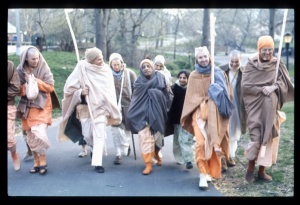SB 10.64.10: Difference between revisions
No edit summary |
(Vanibot #0054 edit - transform synonyms into clickable links, which search similar occurrences) |
||
| Line 24: | Line 24: | ||
<div class="synonyms"> | <div class="synonyms"> | ||
''nṛgaḥ uvāca'' | ''[//vanipedia.org/wiki/Special:VaniSearch?s=nṛgaḥ&tab=syno_o&ds=1 nṛgaḥ] [//vanipedia.org/wiki/Special:VaniSearch?s=uvāca&tab=syno_o&ds=1 uvāca]'' — King Nṛga said; ''[//vanipedia.org/wiki/Special:VaniSearch?s=nṛgaḥ&tab=syno_o&ds=1 nṛgaḥ] [//vanipedia.org/wiki/Special:VaniSearch?s=nāma&tab=syno_o&ds=1 nāma]'' — named Nṛga; ''[//vanipedia.org/wiki/Special:VaniSearch?s=nara&tab=syno_o&ds=1 nara]-[//vanipedia.org/wiki/Special:VaniSearch?s=indraḥ&tab=syno_o&ds=1 indraḥ]'' — a ruler of men; ''[//vanipedia.org/wiki/Special:VaniSearch?s=aham&tab=syno_o&ds=1 aham]'' — I; ''[//vanipedia.org/wiki/Special:VaniSearch?s=ikṣvāku&tab=syno_o&ds=1 ikṣvāku]-[//vanipedia.org/wiki/Special:VaniSearch?s=tanayaḥ&tab=syno_o&ds=1 tanayaḥ]'' — a son of Ikṣvāku; ''[//vanipedia.org/wiki/Special:VaniSearch?s=prabho&tab=syno_o&ds=1 prabho]'' — O Lord; ''[//vanipedia.org/wiki/Special:VaniSearch?s=dāniṣu&tab=syno_o&ds=1 dāniṣu]'' — among men of charity; ''[//vanipedia.org/wiki/Special:VaniSearch?s=ākhyāyamāneṣu&tab=syno_o&ds=1 ākhyāyamāneṣu]'' — when being enumerated; ''[//vanipedia.org/wiki/Special:VaniSearch?s=yadi&tab=syno_o&ds=1 yadi]'' — perhaps; ''[//vanipedia.org/wiki/Special:VaniSearch?s=te&tab=syno_o&ds=1 te]'' — Your; ''[//vanipedia.org/wiki/Special:VaniSearch?s=karṇam&tab=syno_o&ds=1 karṇam]'' — ear; ''[//vanipedia.org/wiki/Special:VaniSearch?s=aspṛśam&tab=syno_o&ds=1 aspṛśam]'' — I have touched. | ||
</div> | </div> | ||
Latest revision as of 19:40, 17 February 2024

A.C. Bhaktivedanta Swami Prabhupada
Please note: The synonyms, translation and purport of this verse were composed by disciples of Śrīla Prabhupāda
TEXT 10
- nṛga uvāca
- nṛgo nāma narendro 'ham
- ikṣvāku-tanayaḥ prabho
- dāniṣv ākhyāyamāneṣu
- yadi te karṇam aspṛśam
SYNONYMS
nṛgaḥ uvāca — King Nṛga said; nṛgaḥ nāma — named Nṛga; nara-indraḥ — a ruler of men; aham — I; ikṣvāku-tanayaḥ — a son of Ikṣvāku; prabho — O Lord; dāniṣu — among men of charity; ākhyāyamāneṣu — when being enumerated; yadi — perhaps; te — Your; karṇam — ear; aspṛśam — I have touched.
Translation and purport composed by disciples of Śrīla Prabhupāda
TRANSLATION
King Nṛga said: I am a king known as Nṛga, the son of Ikṣvāku. Perhaps, Lord, You have heard of me when lists of charitable men were recited.
PURPORT
The ācāryas point out here that although a tentative expression is used—"perhaps You have heard of me"—the implication is that there is no doubt.